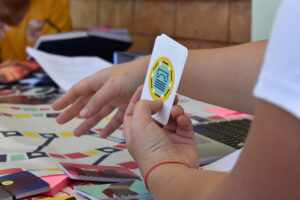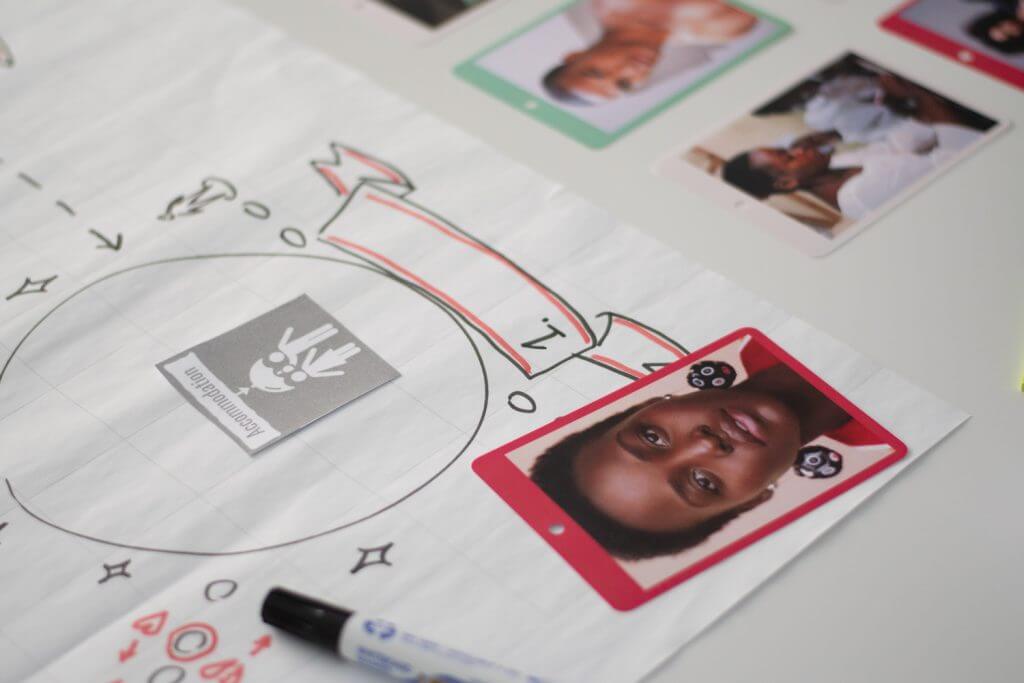Let’s play a game!
”You have a baby! How do you react? What kind of a conversation will you have to have with your partner?”
Visual creative Helena Vizcaino picks up a card with the face of a small child and places it on a large paper board. On the board, the team has drawn circles with numbers and a name tag under each.

For Discover 2 design research phase, the M4ID team created a board game called “Coupling”.
The M4ID design team is testing a board game called “Coupling”. The team is working on Core: a project which works on finding solutions which enhance women’s sexual and reproductive health, and they have created the game to initiate conversation about key relationship stages in a Kenyan woman’s life.
By playing the game, the team collects information on women’s experiences throughout their lives. The research is part of Core’s second design research phase, called Discover 2. Ahead of starting field research, the design team is testing the game now to check if it works and is easy to follow.
The rules
The idea is for the player to choose a character and a partner for her / him from a deck of cards. Then they throw a dice. Every number from 1 to 6 is assigned a circle with a name tag for a relationship stage: dating, moving in together, having a baby or other. The name tags remain empty until the team arrives in the field, as the players themselves name the stages before playing, to reflect their lives realistically.
On rolling the dice, the player moves into the corresponding life stage and is asked to explain how the new stage affects the couple’s relationship.

The design team tested the game a few times in the office before embarking on the Discover 2 research phase.
New life changes may occur, and these might affect the life of the couple – Your partner cheats, how do you react? – A partner has a sexually transmitted disease. What happens?
“Before we started planning our design tools, we thought about what would be the most interesting way of talking about family planning. We wanted to utilize narratives and storytelling to cover different stages of a relationship” explains Jarkko Kurronen, a Senior Service Designer at M4ID.
“Through a game, people can take an outsider point of view and talk openly about topics that might be very sensitive, without getting too personal.”
“The idea of the game is also to show how previous events have an affect on the life course in the future. People’s lives are not an assortment of separate events, but everything is affected by the past choices and events.”
Life course
The Core project takes a life course approach to understand sexual and reproductive health: what has happened in the past inevitably affects how the future plays out and what opportunities arise. A life is affected by a wide range of social, economic, environmental and physical factors, and no life course is the same.

Coupling: the game was developed to work as a design research tool for Core’s Discover 2 phase in Kenya.
“Through the learnings made in the Discover 1 phase of the project, our focus for research in Kenya was directed to family planning. Evidence gathered through desk research, our discussions with experts and partners, as well as our explorations in the field, all pointed to family planning as an issue in need for potential solutions”, Kurronen explains.
“We know family planning is a difficult and sensitive issue for couples to discuss. Maybe we can help out with this. Or we can find other solutions. At this stage, everything is still open”.
In a few weeks, Kurronen and the team will be a little wiser.
Back to news